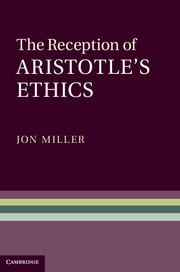
- Cited by 5
-
Cited byCrossref Citations
This Book has been cited by the following publications. This list is generated based on data provided by Crossref.
Polansky, Ronald 2014. The Cambridge Companion to Aristotle's <I>Nicomachean Ethics</I>.
2016. Tomaso Rangone. p. 317.
Bobonich, Christopher 2017. The Cambridge Companion to Ancient Ethics.
Tirosh-Samuelson, Hava 2017. Encyclopedia of Medieval Philosophy. p. 1.
Tirosh-Samuelson, Hava 2020. Encyclopedia of Medieval Philosophy. p. 534.
- Publisher:
- Cambridge University Press
- Online publication date:
- February 2013
- Print publication year:
- 2012
- Online ISBN:
- 9780511979873




